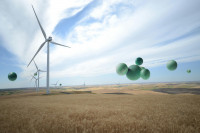How companies are driving new growth through circular economy
by Michael Fleck
The mindful use of raw materials and the shift away from disposable products toward innovative, sustainable products play an important role in today's economy. Circular economy is a central concept in this context.
It encompasses the conscious choice of materials, careful production, sustainable use and, above all, recyclability of a product. EU-wide legal regulations for manufacturers and retailers in this area have been under development for some time, and the foundations have already been laid for a new Recycling Management Act. In the long term, therefore, every company will have to address the issue and take the steps toward a sustainable business model.
However, the supposedly difficult and costly implementation of a circular economy in line with the new legal requirements simultaneously offers many advantages. This is because the Circular Economy not only protects people and nature, but also offers companies the opportunity to align their growth with values oriented towards the common good and specifically serves to ensure sustainable economic success.
Companies should ensure a closed loop system
However, in order for a company to be part of a closed-loop economy, it must first be extensively examined whether its own product range meets the associated qualifications.
The most important factors in this regard are, on the one hand, the quality of the materials used in the product and, on the other hand, the possibility of reusing these very materials. The prerequisite for a closed loop is therefore products whose materials and processing are suitable for several sales cycles and are thus correspondingly durable.
The challenge of every company and its brand managers is therefore not to produce any disposable or throwaway products within conception, design, sales process and aftersales. The ideal result is a closed loop of returning, reworking and reselling products (reuse and upcycling).
A major pioneer of the Circular Economy is the fashion company Filippa K from Sweden, which offers a "Preowned" section in addition to its new garments. This was established as part of the company's circular business model in 2014 and has since offered its customers the opportunity to purchase second-hand garments for a lower price, as well as offer their own for sale.
To ensure the longevity and reusability of the clothing in this regard, care is taken to ensure that these meet the highest quality standards and are designed for recycling.
Filippa K is therefore a pioneer in the Circular Economy and with its innovative business model has managed to raise the status of recycled products to the same level as that of new goods and, as a result, serves as a source of inspiration for many companies.
Digital product passport - a tool for the circular economy
But what steps will help your own company to establish a circular economy and draw your customers along with you? An innovative tool for the introduction of the circular economy and the associated reuse of products is the digital product passport.
This helps to track the circularity of products in order to record possible improvements in production from the resulting data. The Digital Product Passport therefore helps to optimize the quality, longevity and recyclability of the product and thus makes a positive contribution to the introduction of the circular economy within a company. In order to ensure successful implementation, companies need to focus on their customers and think in a user-centric way.
Accordingly, it makes sense to combine the Digital Product Passport with an incentive in order to control sustainable consumer behavior in a targeted manner as a company.
Reward systems as incentives
One way of incentivizing this is to introduce a reward system for customers who decide to purchase a circular product. For example, points are collected as soon as old products are returned to the company. These can then be converted into money, which can be reinvested in further circular products.
The resulting side effect is customer loyalty as well as the automatic step towards sustainability. This is because, due to reuse, the products go through a longer life cycle and thus contribute to sustainable and conscious use.
Thus, the introduction of the Digital Product Passport and the Reward System for circular products as stand-alone components is quite progressive for a company.
However, in order to provide the innovation factor and the associated unique selling proposition, it is an exciting challenge for any company to achieve a combination of both components. The development of a product that has both a product passport and an associated reward system has hardly been seen on the market to date.
With the help of the right tools and tactics, the circular economy offers a unique opportunity, particularly in the manufacturing and trading sectors, to think about the economy and values together and thus to ensure new and, above all, sustainable growth. Company leaders who are committed to concepts and business models in the sense of the circular economy and act in the right way will thus create new growth potential in the future.


